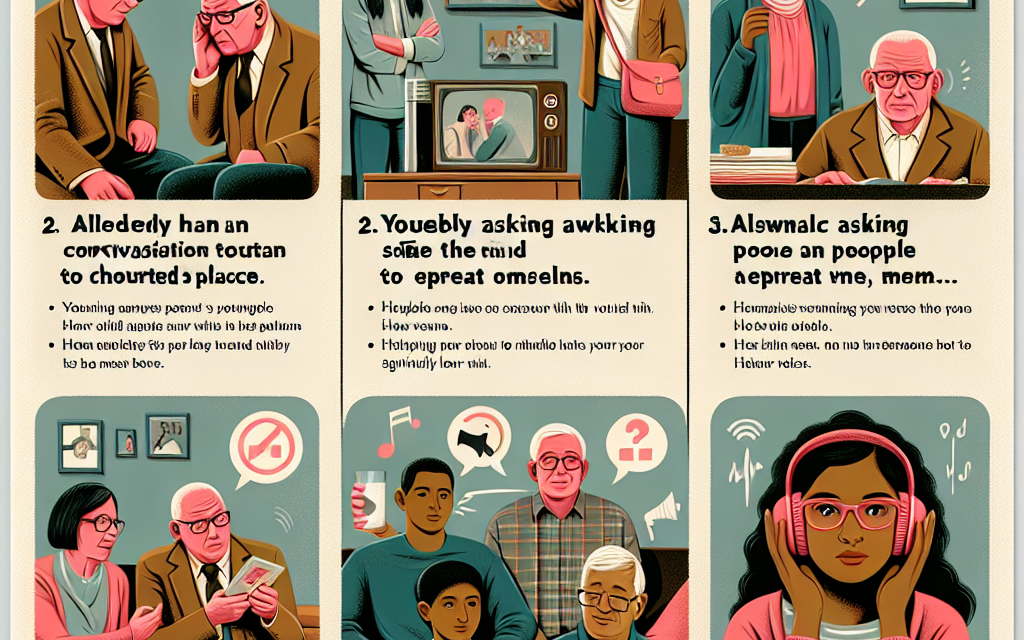Warning Signs That Indicate It’s Time for a Hearing Specialist Visit
Hearing is one of our most vital senses, allowing us to communicate, enjoy music, and engage with the world around us. However, many people overlook the importance of regular hearing assessments and fail to recognize the warning signs that indicate a need for professional evaluation. This article will explore the key indicators that suggest it may be time to visit a hearing specialist, providing valuable insights into hearing health and the importance of early intervention.
1. Difficulty Understanding Conversations
One of the most common signs that you may need to see a hearing specialist is difficulty understanding conversations, especially in noisy environments. This issue can manifest in various ways, such as frequently asking people to repeat themselves or struggling to follow discussions in group settings.
Research indicates that approximately 48 million Americans experience some degree of hearing loss, and many report that background noise exacerbates their difficulties. This phenomenon is known as “auditory processing,” where the brain struggles to interpret sounds, particularly when competing noises are present.
- Straining to Hear: If you find yourself straining to hear what others are saying, it may be time to consult a specialist. This strain can lead to fatigue and frustration, impacting your overall quality of life.
- Misunderstanding Words: Frequently mishearing words or phrases can be a significant indicator of hearing loss. For example, confusing “I love you” with “I love soup” can lead to awkward social situations.
- Difficulty with High Frequencies: Many people with hearing loss struggle to hear high-frequency sounds, such as the voices of women and children. If you notice this pattern, it’s essential to seek professional help.
Understanding conversations is crucial for maintaining relationships and social interactions. If you find that you are withdrawing from conversations or avoiding social situations due to hearing difficulties, it’s time to schedule an appointment with a hearing specialist.
2. Frequent Ringing in the Ears (Tinnitus)
Tinnitus, often described as a ringing, buzzing, or hissing sound in the ears, affects millions of people worldwide. This condition can be a significant warning sign of underlying hearing issues and should not be ignored. Tinnitus can be temporary or chronic, and its severity can vary from person to person.
According to the American Tinnitus Association, approximately 15% of the adult population experiences some form of tinnitus. While it can occur due to exposure to loud noises, ear infections, or age-related hearing loss, persistent tinnitus may indicate more serious conditions that require professional evaluation.
- Types of Tinnitus: Tinnitus can be classified into two main types: subjective and objective. Subjective tinnitus is the most common form, where only the affected person can hear the sound. Objective tinnitus, on the other hand, can be detected by a healthcare professional during an examination.
- Impact on Daily Life: Tinnitus can significantly affect daily activities, leading to difficulties concentrating, sleeping, and even anxiety or depression. If you find that tinnitus is interfering with your quality of life, it’s essential to seek help.
- Potential Causes: Various factors can contribute to tinnitus, including exposure to loud noises, earwax buildup, and certain medications. A hearing specialist can help identify the underlying cause and recommend appropriate treatment options.
If you experience persistent or bothersome tinnitus, it’s crucial to consult a hearing specialist. They can provide a thorough evaluation and discuss potential treatment options, which may include sound therapy, cognitive behavioral therapy, or hearing aids.
3. Increasing Sensitivity to Sounds
Another warning sign that may indicate a need for a hearing specialist visit is an increasing sensitivity to sounds, also known as hyperacusis. Individuals with hyperacusis may find everyday sounds—such as the ringing of a phone or the sound of a vacuum cleaner—overwhelming or painful.
This condition can be distressing and may lead to social withdrawal or avoidance of certain environments. Hyperacusis can occur alongside hearing loss or tinnitus and may be linked to various factors, including noise exposure, head injuries, or certain medical conditions.
- Understanding Hyperacusis: Hyperacusis is not merely a dislike of loud sounds; it is a heightened sensitivity that can cause discomfort or pain. This condition can significantly impact one’s ability to engage in everyday activities.
- Social Implications: Individuals with hyperacusis may avoid social situations due to fear of overwhelming sounds. This avoidance can lead to isolation and negatively affect mental health.
- Seeking Help: If you notice that you are becoming increasingly sensitive to sounds, it’s essential to consult a hearing specialist. They can assess your condition and recommend strategies to manage sensitivity.
Addressing hyperacusis early on can help prevent further complications and improve your overall quality of life. A hearing specialist can provide tailored solutions to help you cope with sound sensitivity.
4. Withdrawal from Social Activities
Social withdrawal is a common response to hearing difficulties. If you find yourself avoiding social gatherings, family events, or even one-on-one conversations due to hearing challenges, it may be time to seek help from a hearing specialist.
Social interactions are essential for mental and emotional well-being. Research has shown that individuals with untreated hearing loss are more likely to experience feelings of loneliness and depression. The National Institute on Deafness and Other Communication Disorders (NIDCD) reports that people with hearing loss are more likely to withdraw from social activities, leading to a decline in overall health.
- Recognizing the Signs: If you notice that you are frequently declining invitations or feeling anxious about social situations, it’s crucial to reflect on whether hearing difficulties are contributing to this behavior.
- Impact on Relationships: Hearing loss can strain relationships with family and friends. Misunderstandings and communication breakdowns can lead to frustration and resentment, making it essential to address the issue.
- Seeking Support: If you are experiencing social withdrawal due to hearing challenges, consider reaching out to a hearing specialist. They can provide solutions that may help you regain confidence in social settings.
By addressing hearing difficulties, you can improve your social interactions and overall quality of life. A hearing specialist can help you explore options such as hearing aids or assistive listening devices that can enhance your ability to engage with others.
5. Family History of Hearing Loss
Family history plays a significant role in the likelihood of developing hearing loss. If you have relatives who have experienced hearing issues, it’s essential to be proactive about your hearing health. Genetic factors can contribute to various types of hearing loss, including age-related and noise-induced hearing loss.
According to the World Health Organization (WHO), approximately 1.5 billion people worldwide experience some form of hearing loss, and genetic predisposition is a significant risk factor. Understanding your family history can help you make informed decisions about your hearing health.
- Understanding Genetic Factors: Certain genetic conditions can lead to progressive hearing loss. If you have a family history of such conditions, it’s crucial to monitor your hearing regularly.
- Proactive Measures: If you are aware of a family history of hearing loss, consider scheduling regular hearing assessments with a specialist. Early detection can lead to more effective management and treatment options.
- Communicating with Family: Discussing hearing health with family members can help raise awareness and encourage others to seek evaluations if they notice changes in their hearing.
Being proactive about your hearing health is essential, especially if you have a family history of hearing loss. Regular check-ups with a hearing specialist can help you stay informed and take necessary steps to protect your hearing.
Conclusion
Recognizing the warning signs that indicate a need for a hearing specialist visit is crucial for maintaining optimal hearing health. Difficulty understanding conversations, frequent ringing in the ears, increasing sensitivity to sounds, withdrawal from social activities, and a family history of hearing loss are all significant indicators that should not be ignored.
Early intervention is key to managing hearing loss effectively. By seeking help from a hearing specialist, you can explore various treatment options, including hearing aids, sound therapy, and counseling, to improve your quality of life. Remember, your hearing health is an essential aspect of your overall well-being, and taking proactive steps can lead to a more fulfilling and connected life.
In summary, if you or someone you know is experiencing any of the warning signs discussed in this article, don’t hesitate to reach out to a hearing specialist. Your hearing health matters, and timely intervention can make all the difference.





